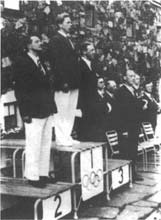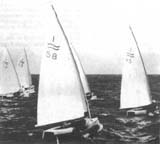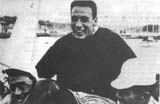Enter the Finn
The Olympics for 1952 were assigned to Helsinki, Finland and the IYRU decided to keep the formula boat, the 6-Meter, for the last time. The 6-Meter had been in every Olympic games since they had started. The two-man keel boat, the Star was kept and the other one-design boat was the Dragon. The Swallow was replaced by the 5.5 meter which was a formula boat which required that it have a rating of 5.5 meters. The designers had a field day after the IYRU approved the new class in 1949 trying to design a boat to this rating that would be fast. The boats usually ended up about 32 feet long with a keel and a crew of three. |
 |
| The fleet at the 1952 Olympics |
|
| The Firefly and the Olympia-Jolle had been so unsatisfactory and there was no Scandinavian dinghy worthy of being used as the Monotype for the Olympics. So, the Finish Yachting Association, who had been assigned the job of selecting the class for the Monotype, set about to run a contest for a new boat designed specifically for the Olympics which could also be used for sailing competitions in Scandinavia. This was the birth of the Finn about which Rickard Sarby has given a candid record. |
 |
Finally the Finn became selected for the monotype for the 1952 Olympics. As everyone now knows, put Elvstrom in anything and he will win. And so he did in the Finn at the 1952 Olympics. Elvstrom this time swept the board and was nearly 3,000 points ahead of Charles Currey of Great Britain at the end. He won four of the seven races in a fleet of 28 boats and set a standard which has never been equalled. The Finn's designer, Sarby just managed to turn the tables on De Jongh this time, in spite of badly injuring his hand before the sixth race, but the Americans dropped from 2nd at Torbay to last at Helsinki. Note Jaques Lebrun still competing in the Monotype Class after twenty years, whilst Helmut Stauch appears in the new boat which is superficially similar to his 1936 Monotype design. Paul Elvstrom won because of his hiking technique, which he had developed practising in his own boat. Most of his competitors were rather sitting on the sidedeck instead of hiking on the sheer guard, as everybody does now-a-days. In addition Paul attached a sort of traveller to his boat, which was not supplied by the organiser.Most competitors considered this alteration to be illegal but the Dane got away with it. However after the fifth race, when it was already for sure, that he had won the Gold medal, Elvstrom removed the device again, in order to calm the grumbling feelings. A second incidence caused the protest of 16 participants.The British and the South African sailor had their sails altered after the fifth race. In those days the cotton sails were extremely sensitive and changed considerably during the regatta. Between the races most of the competitors had their sails up on the masts in order to shape the mains ashore. |
Prizegiving in 1952
Gold: Paul Elvstrom,
Silver: Charles Currey,
Bronze: Rickard Sarby |
|
| During the races the sails got wet in addition to being under stress and the shape deteriorated. Having the sails repaired by a professional sailmaker gave the two competitors an advantage. However the jury dismissed the protest and thus Charles Currey won the silver medal.
In 1956 Olympics were assigned to Melbourne, Australia. The IYRU decided that the 6-Meter class had become too expensive for many countries to afford and so authorised a new formula class of 5.5 meters for the Olympics. The old 8-Meter class was completely eliminated and a 'Sharpie' class, a 12 m2 formula boat was used. The Dragon, Star and Monotype were the other events. The Finn had proved to be such a great competitive boat in the 1952 Olympics that it was retained as the Monotype for the 1956 Olympics. The Finns mustered twenty-two entries and again Elvstrom slaughtered the opposition, this time with five wins in his score - a fantastic feat! Going into the last race it looked as though the American John Marvin, who had never raced a Finn before, might topple the clever and the outstanding Belgian Andre Nelis since they were level on points at 2nd. But Nelis pulled out all the stops and kept Marvin covered whilst notching up a second place himself.
At the other end of the scale the battle between the enormous and perpetually grinning Burmese weight-lifter Maung Maung Lwin and the equally enormous Fijian reserve helmsman to keep off bottom place kept everyone just as much on tenterhooks. The first question the shore party asked was always "Who won?" but they did not mean Elvstrom! For the record - Burma triumphed. The weather was comparatively kind with the exception of the first race, in winds up to Force 7 gusts, and the fourth when the wind reached 55 m.p.h. The Finns fortunately did not have to face this latter test since they started last and were postponed. The other classes were under way before the wind really got going.
|
Major Changes
In 1956 the International Finn Association was organised to administer the rapidly growing class under the cognizance of the IYRU and to assist with the Olympic games. For the 1960 Olympics in Rome with the yachting events in Naples the Sharpie was dropped from the Olympics and the two man centreboarder, the Flying Dutchman was added. This left only the 5.5 Meter as a formula boat for designers to play with. The winds were light but rather variable in direction and the sun shone out of a hot sky. Who could blame the people of Italy for ignoring the greatest sporting festival of our time? There was sunbathing to be done and important activities like underwater swimming and drinking good wine to be got through at some time during the long day. |
 |
| 4 times Gold - Paul Elvstrom |
|
| The competitors even were sometimes tempted to forget that the object of their visit was to persuade a painfully slow floating object to travel by a vaguely defined route a shade less slowly than a few others. It really was altogether too nice a place to hold Olympic yachting. But the competitors rose to the challenge in the end and a very good if somewhat uninspiring series resulted. |
 |
There was a great increase to thirty-five Finns and Elvstrom did it again! This time he only won three races and had to withdraw from the last through illness, but he was never lower than 5th in conditions which did not enable him to gain by his fantastic strength and endurance. This was the year that Russia arrived as a top sailing nation and in the Finns the Silver Medal was won by Chuchelov. Nelis of Belgium was thus displaced to 3rd. A glance at the list of competitors shows that only a few previous Olympic entrants appear again. Our Burmese weightlifter is here again and moves up marginally, The only other 'old' names are Kenneth Albury, the Bahamian who was at Helsinki and Melbourne, where he was one of a total national Olympic team of three men, and the Belgian Andre Nelis. Albury surprised everyone including himself by winning one of the races and finished 8th on points, whilst Nelis moved down one to 3rd.
|
| The fleet at the 1960 Olympics |
|
The 1964 Olympics was assigned to Tokyo, Japan. The IYRU decided to keep the same classes for this Olympics. The problem of the choice of the Monotype had been solved with the Finn. Here was a class that required training and conditioning like other Olympic events, required skills and dexterity to sail competitively, and was being sailed throughout the world by competitive athletic sailors. The changing of the Monotype competition each Olympics to some local dinghy that other countries had not seen or been able to practice with, was finally gone. However, for the 1964 Olympics, the hull of the boats to be furnished by the Japanese would be fibreglass instead of wood. The Finn event in the Olympics was actually sailed at Enoshima in Tokyo Bay. Paul Elvstrom did not enter the Finn class but Henning Wind of Denmark took 3rd in a 33 boat field. |
In 1964 Germany was the leading nation in the Finn. The Federal Republic of Germany and the German Democratic Republic had agreed to send one team and therefore only one competitor in the Finn event. The internal trials in Germany ended up with team sailing and endless protests. So both top representatives Willy Kuhweide and Bernd Dehmel went to Tokyo, where the Japanese were kind enough to organise the final trials between the two competitors only, with no possibility of further team sailing.
|
 |
| Gold Medal Winner 1964 Willy Kuhweide |
|
When Dehmel did not appear on the water Kuhweide was assigned to represent Germany. Willy had the mental strength to stay on top of the Finn fleet in actual Olympic racing as well, despite a severe infection of the middle ear. Before the last race Kuhweide had 6018 points, Peter Barrett scored 5599, and Henning Wind 5570. However in that race the American and the Dane watched each other and finished 7th and 10th, allowing the German once again line honours and Gold. |
|
| 1952 Helsinki, Finland |
| (28 entries) |
| 1. |
Paul Elvstrom |
D |
8209 |
| 2. |
Charles Currey |
Ê |
5449 |
| 3. |
Rickard Sarby |
S |
5051 |
| 4. |
Koos de Jongh |
H |
5033 |
| 5. |
Wolff Erndl |
OE |
4373 |
| 6. |
M. Skaugen |
N |
4073 |
| 7. |
Adelchi Pelaschier |
I |
4068 |
| 8. |
Paul McLaughlin |
ÊÑ |
4033 |
| 9. |
A. F. Bercht |
BL |
3711 |
| 10. |
R. Balcells |
E |
3644 |
| 11. |
Jaques Lebrun |
F |
|
| 12. |
P. Gorelikov |
SR |
|
| 13. |
Willy Pieper |
Z |
|
| 14. |
Kenneth Albury |
BA |
|
| 1956 Melbourne, Australia (20 entries) |
| 1. |
Paul Elvstrom |
D |
7509 |
| 2. |
Andre Nelis |
 |
6254 |
| 3. |
John Marvin |
US |
5953 |
| 4. |
Jurgen Vogler |
DDR |
4199 |
| 5. |
Rickard Sarby |
S |
3990 |
| 6. |
Eric Bongers |
SA |
3912 |
| 7. |
Adelchi Pelaschier |
I |
3409 |
| 8. |
Brace Kirby |
ÊÑ |
3213 |
| 9. |
Kenneth Albury |
BA |
3182 |
| 10. |
Colin Ryrie |
KA |
2965 |
|
| 1960 Naples, Italy (35 entries) |
| 1. |
Paul Elvstrom |
D |
8171 |
| 2. |
A. Chuchelov |
SR |
6520 |
| 3. |
Andre Nelis |
 |
5934 |
| 4. |
Ron Jenyns |
KA |
5758 |
| 5. |
Reinaldo Conrad |
BL |
5176 |
| 6. |
R. Roberts |
KZ |
5140 |
| 7. |
Ian Bruce |
ÊÑ |
5123 |
| 8. |
Kenneth Albury |
BA |
5092 |
| 9. |
Yves Louis Pinaud |
F |
4604 |
| 10. |
Òînkî Pivecevic |
Y |
4358 |
| 11. |
Peter Barrett |
US |
3976 |
| 12. |
Vernon Stratton |
Ê |
3871 |
| 13. |
Per Jordebakke |
N |
3822 |
| 14. |
Bruno Trani |
I |
3553 |
| 15. |
H. de Oliviera |
P |
3488 |
| 16. |
Jouko Valli |
L |
|
| 17. |
Peter Furst |
OE |
|
| 18. |
J. Somers Payne |
IR |
|
|
| 1964 Enoshima, Japan (33 entries) |
| 1. |
Willy Kuhweide |
G |
7638 |
| 2. |
Peter Barrett |
US |
6373 |
| 3. |
Henning Wind |
D |
6190 |
| 4. |
P. Mander |
KZ |
5684 |
| 5. |
Hubert Raudaschl |
OE |
5405 |
| 6. |
Colin Ryrie |
KA |
5273 |
| 7. |
Jorg Bruder |
BL |
4956 |
| 8. |
P. Kouligas |
GR |
4546 |
| 9. |
G. Devillard |
F |
4528 |
| 10. |
Andre Nelis |
 |
4210 |
| 11. |
Bruce Kirby |
ÊÑ |
4178 |
| 12. |
Alexander Chuchelov |
SR |
3774 |
| 13. |
Gyorgy Finaczy |
M |
3771 |
| 14. |
Boris Jacobson |
S |
3692 |
| 14. |
Per Jordbakke |
N |
3687 |
| 16. |
Willems |
H |
3281 |
|
|
|